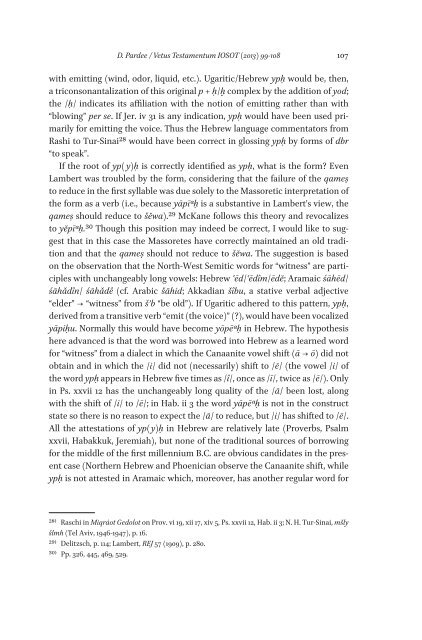Special Issue IOSOT 2013 - Books and Journals
Special Issue IOSOT 2013 - Books and Journals
Special Issue IOSOT 2013 - Books and Journals
You also want an ePaper? Increase the reach of your titles
YUMPU automatically turns print PDFs into web optimized ePapers that Google loves.
D. Pardee / Vetus Testamentum <strong>IOSOT</strong> (<strong>2013</strong>) 99-108 107<br />
with emitting (wind, odor, liquid, etc.). Ugaritic/Hebrew ypḥ would be, then,<br />
a triconsonantalization of this original p + ḥ/ḫ complex by the addition of yod;<br />
the /ḥ/ indicates its affiliation with the notion of emitting rather than with<br />
“blowing” per se. If Jer. iv 31 is any indication, ypḥ would have been used primarily<br />
for emitting the voice. Thus the Hebrew language commentators from<br />
Rashi to Tur-Sinai28 would have been correct in glossing ypḥ by forms of dbr<br />
“to speak”.<br />
If the root of yp( y)ḥ is correctly identified as ypḥ, what is the form? Even<br />
Lambert was troubled by the form, considering that the failure of the qameṣ<br />
to reduce in the first syllable was due solely to the Massoretic interpretation of<br />
the form as a verb (i.e., because yāpīaḥ is a substantive in Lambert’s view, the<br />
qameṣ should reduce to šĕwa).29 McKane follows this theory <strong>and</strong> revocalizes<br />
to yĕpīaḥ.30 Though this position may indeed be correct, I would like to suggest<br />
that in this case the Massoretes have correctly maintained an old tradition<br />
<strong>and</strong> that the qameṣ should not reduce to šĕwa. The suggestion is based<br />
on the observation that the North-West Semitic words for “witness” are participles<br />
with unchangeably long vowels: Hebrew ʿēd/ʿēdîm/ēdĕ; Aramaic śāhēd/<br />
śāhǎdîn/ śāhǎdê (cf. Arabic šāhid; Akkadian šîbu, a stative verbal adjective<br />
“elder” → “witness” from šʾb “be old”). If Ugaritic adhered to this pattern, ypḥ,<br />
derived from a transitive verb “emit (the voice)” (?), would have been vocalized<br />
yāpiḥu. Normally this would have become yōpēaḥ in Hebrew. The hypothesis<br />
here advanced is that the word was borrowed into Hebrew as a learned word<br />
for “witness” from a dialect in which the Canaanite vowel shift (ā → ō) did not<br />
obtain <strong>and</strong> in which the /i/ did not (necessarily) shift to /ē/ (the vowel /i/ of<br />
the word ypḥ appears in Hebrew five times as /î/, once as /ī/, twice as /ē/). Only<br />
in Ps. xxvii 12 has the unchangeably long quality of the /ā/ been lost, along<br />
with the shift of /i/ to /ē/; in Hab. ii 3 the word yāpēaḥ is not in the construct<br />
state so there is no reason to expect the /ā/ to reduce, but /i/ has shifted to /ē/.<br />
All the attestations of yp( y)ḥ in Hebrew are relatively late (Proverbs, Psalm<br />
xxvii, Habakkuk, Jeremiah), but none of the traditional sources of borrowing<br />
for the middle of the first millennium B.C. are obvious c<strong>and</strong>idates in the present<br />
case (Northern Hebrew <strong>and</strong> Phoenician observe the Canaanite shift, while<br />
ypḥ is not attested in Aramaic which, moreover, has another regular word for<br />
28) Raschi in Miqraʾot Gedolot on Prov. vi 19, xii 17, xiv 5, Ps. xxvii 12, Hab. ii 3; N. H. Tur-Sinai, mšly<br />
šlmh (Tel Aviv, 1946-1947), p. 16.<br />
29) Delitzsch, p. 114; Lambert, REJ 57 (1909), p. 280.<br />
30) Pp. 326, 445, 469, 529.








![Am HaSefer [Volk des Buches] - Books and Journals](https://img.yumpu.com/20648352/1/174x260/am-hasefer-volk-des-buches-books-and-journals.jpg?quality=85)







